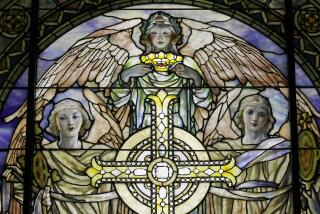Extra-celestial
- Share via
CALL it a celestial case of trading up: The prophet Elijah, carried to heaven in a chariot, becomes the angel Sandalphon. Enoch becomes Metatron and St. Francis, gentle lover of animals, is transformed into Rhamiel. “Fallen Angels” (Yale: 72 pp., $16) is literary critic Harold Bloom’s meditation on the metaphoric power of angels in Western culture. “[F]or me a fallen angel and a human being are two terms for the same entity or condition,” he declares.
Bloom doesn’t suggest that there’s a winged figure crouched on your shoulder, protecting you from temptation and falling pianos. What he gets at in this brief work is that by treating angels as different from us, we have lessened ourselves: We forget that angels “represent something that was ours and that we have the potential to become again.”
His is a Gnostic vision of the universe; he describes how Judeo-Christian concepts of good and evil have been infected -- and inflected -- by Zoroastrianism and other influences. The book is less a thorough analysis than a prose-poem, an opportunity to witness Bloom’s prodigious mind in action.
The literary DNA of his Shakespeare and Milton studies, and of an “anxiety of influence” that he says affects all artistic creation, is here in miniature. Contemplating a “Hamlet” monologue -- “What a piece of work is man . . . in action how like an angel, in apprehension how like a god!” -- he asks: “Are we a mockery of them, or do they suggest to us, as they did to Hamlet, something godlike about the human imagination, with its apprehension of something evermore about to be?”
-- Nick Owchar
More to Read
Sign up for our Book Club newsletter
Get the latest news, events and more from the Los Angeles Times Book Club, and help us get L.A. reading and talking.
You may occasionally receive promotional content from the Los Angeles Times.







